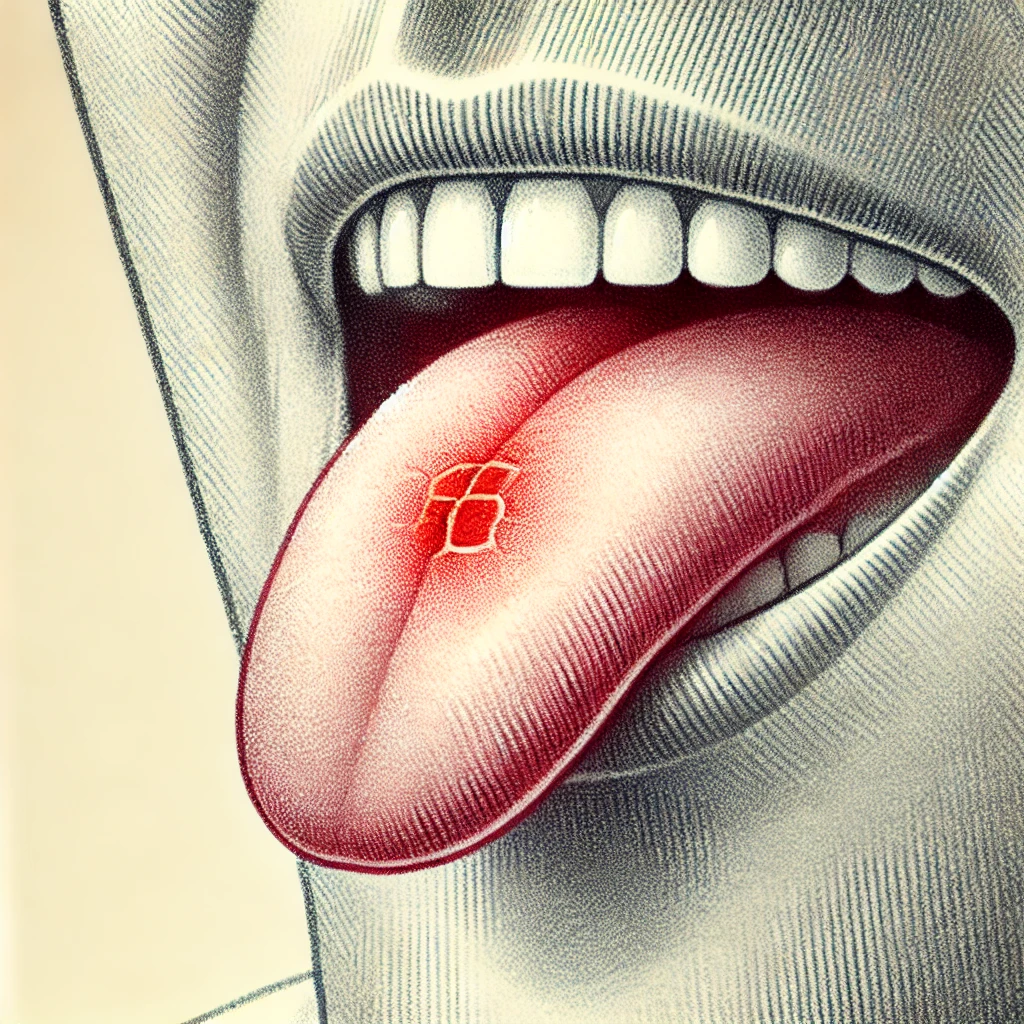How To Treat Tongue Pain:-Tongue pain, though often overlooked, can be a source of immense discomfort. The tongue plays a crucial role in our daily activities such as speaking, eating, and swallowing. When pain occurs, it can interrupt these essential tasks, causing frustration. In this article, we will explore the causes, symptoms, remedies, and preventive measures for tongue pain. By understanding this condition, you will be better equipped to manage or avoid it.

What is Tongue Pain:-
Tongue pain refers to any discomfort, soreness, or burning sensation experienced on the surface or underside of the tongue. It may be constant or sporadic and can range from mild irritation to severe pain. The condition may accompany visible symptoms such as swelling, redness, or sores, or it may manifest without any visible signs.
Common Causes of Tongue Pain:-
There are several reasons why you may experience tongue pain. Identifying the root cause is crucial for effective treatment.
1. Injuries and Burns: Accidental biting, chewing hard foods, or drinking hot liquids can lead to tongue injuries or burns. These can cause temporary pain and discomfort.
2. Canker Sores: Also known as aphthous ulcers, canker sores are small, painful lesions that can appear on the tongue. These sores may be triggered by stress, certain foods, or trauma to the mouth.
3. Infections: Bacterial, viral, or fungal infections like oral thrush or herpes simplex can cause tongue pain. Thrush, in particular, results from a yeast overgrowth and leads to a white, painful coating on the tongue.
4. Vitamin Deficiencies: A lack of essential vitamins, especially B vitamins, iron, and folic acid, can result in tongue inflammation and pain. Glossitis, the medical term for tongue inflammation, may accompany this deficiency.
5. Allergic Reactions: Food allergies or reactions to medications can irritate the tongue and lead to pain or swelling.
6. Oral Cancer: Though less common, persistent tongue pain accompanied by lumps or lesions may indicate oral cancer. It is important to consult a healthcare provider if you experience ongoing pain or abnormal growths.
7. Burning Mouth Syndrome (BMS): This condition involves a burning sensation in the tongue without an apparent cause. BMS may also affect the lips, gums, and palate. Stress, hormonal imbalances, or nerve damage are often linked to this syndrome.
8. Dental Appliances: Braces, dentures, or retainers that do not fit properly can cause friction against the tongue, leading to pain or irritation.
9. Oral Hygiene Products: Some people may be sensitive to certain ingredients in toothpaste or mouthwash, resulting in tongue pain. Sodium lauryl sulfate (SLS) is a common irritant found in many oral hygiene products.
Symptoms Associated with Tongue Pain:-
While the primary symptom is pain or discomfort, there may be additional signs, depending on the underlying cause:
- Swelling or redness: Often occurs with infections, injuries, or allergic reactions.
- White patches or coatings: This is commonly seen in oral thrush or canker sores.
- Burning sensation: Particularly common in cases of burning mouth syndrome.
- Dry mouth: Sometimes, tongue pain may accompany dry mouth, which exacerbates discomfort.
- Difficulty swallowing or talking: When the tongue is sore, everyday tasks like talking or eating can become painful.
Remedies for Tongue Pain:-
The treatment for tongue pain depends on its cause. Here are some remedies you can try to alleviate the discomfort:
1. Over-the-Counter (OTC) Pain Relievers: Non-prescription medications such as ibuprofen or acetaminophen can reduce pain and inflammation associated with tongue injuries or infections.
2. Salt Water Rinse: Gargling with warm salt water (1/2 teaspoon of salt in 8 ounces of water) several times a day can soothe canker sores, injuries, and infections.
3. Aloe Vera Gel: Applying a small amount of natural aloe vera gel to the affected area can provide relief for burns or sores. Aloe vera has soothing and anti-inflammatory properties.
4. Avoid Spicy and Acidic Foods: Spicy, salty, or acidic foods can exacerbate tongue pain, especially if you have canker sores or injuries. Stick to soft, bland foods until the pain subsides.
5. Maintain Good Oral Hygiene: Gently brush your teeth and tongue to keep the area clean and reduce the risk of infections. Use a soft-bristled toothbrush to avoid irritating sensitive areas.
6. Hydrogen Peroxide Solution: For canker sores, mix equal parts water and hydrogen peroxide and apply to the sore using a cotton swab. This helps prevent infection and speeds up healing.
7. Vitamin Supplements: If your tongue pain is due to vitamin deficiencies, taking a B-complex supplement or increasing your intake of iron and folic acid-rich foods (like leafy greens and beans) can help.
8. Antifungal or Antiviral Medications: If the tongue pain is caused by an infection like oral thrush or a herpes outbreak, your doctor may prescribe antifungal or antiviral medications.
9. Hydration: Staying hydrated helps maintain moisture in the mouth and can reduce irritation.
10. Stress Management: Since stress can contribute to conditions like canker sores or burning mouth syndrome, practicing stress management techniques such as meditation, deep breathing, or yoga may reduce symptoms.
When to See a Doctor:-
While most cases of tongue pain resolve on their own or with home remedies, some situations require medical attention:
- Persistent or worsening pain that does not improve within a week.
- Lumps or lesions on the tongue that don’t heal after two weeks.
- Difficulty swallowing or speaking that becomes increasingly severe.
- Unexplained weight loss, which could be a sign of a more serious condition, such as oral cancer.
If you experience any of these symptoms, it is essential to consult with a healthcare provider or a dentist for proper diagnosis and treatment.
How To Treat Tongue Pain
Prevention is key to avoiding future tongue pain episodes. Here are some tips to help you maintain a healthy tongue:
1. Practice Proper Oral Hygiene: Brush and floss your teeth regularly, and clean your tongue with a tongue scraper or toothbrush. This reduces the risk of infections and sores.
2. Eat a Balanced Diet: Ensure you’re getting adequate vitamins and minerals, particularly B vitamins, iron, and folic acid, which help maintain oral health.
3. Avoid Smoking and Alcohol: Smoking and excessive alcohol consumption can irritate the mouth and increase the risk of infections or oral cancer.
4. Use Gentle Oral Care Products: If you have sensitive oral tissues, switch to an SLS-free toothpaste and a mouthwash without alcohol to avoid irritation.
5. Stay Hydrated: Drinking plenty of water prevents dry mouth, which can lead to irritation and pain.
6. Manage Stress: Reducing stress can help prevent canker sores and burning mouth syndrome.
READ MORE- How To Get Rid Of Numbness in Tongue
Conclusion:-
How To Treat Tongue Pain:-Tongue pain can be an uncomfortable and sometimes alarming condition, but in most cases, it can be treated and prevented with proper care. Identifying the cause of your discomfort is the first step toward relief. Whether the issue is as simple as a canker sore or as complex as a vitamin deficiency or infection, the remedies and preventive measures outlined in this article should help. Remember to consult with a healthcare provider if your symptoms persist or worsen.
